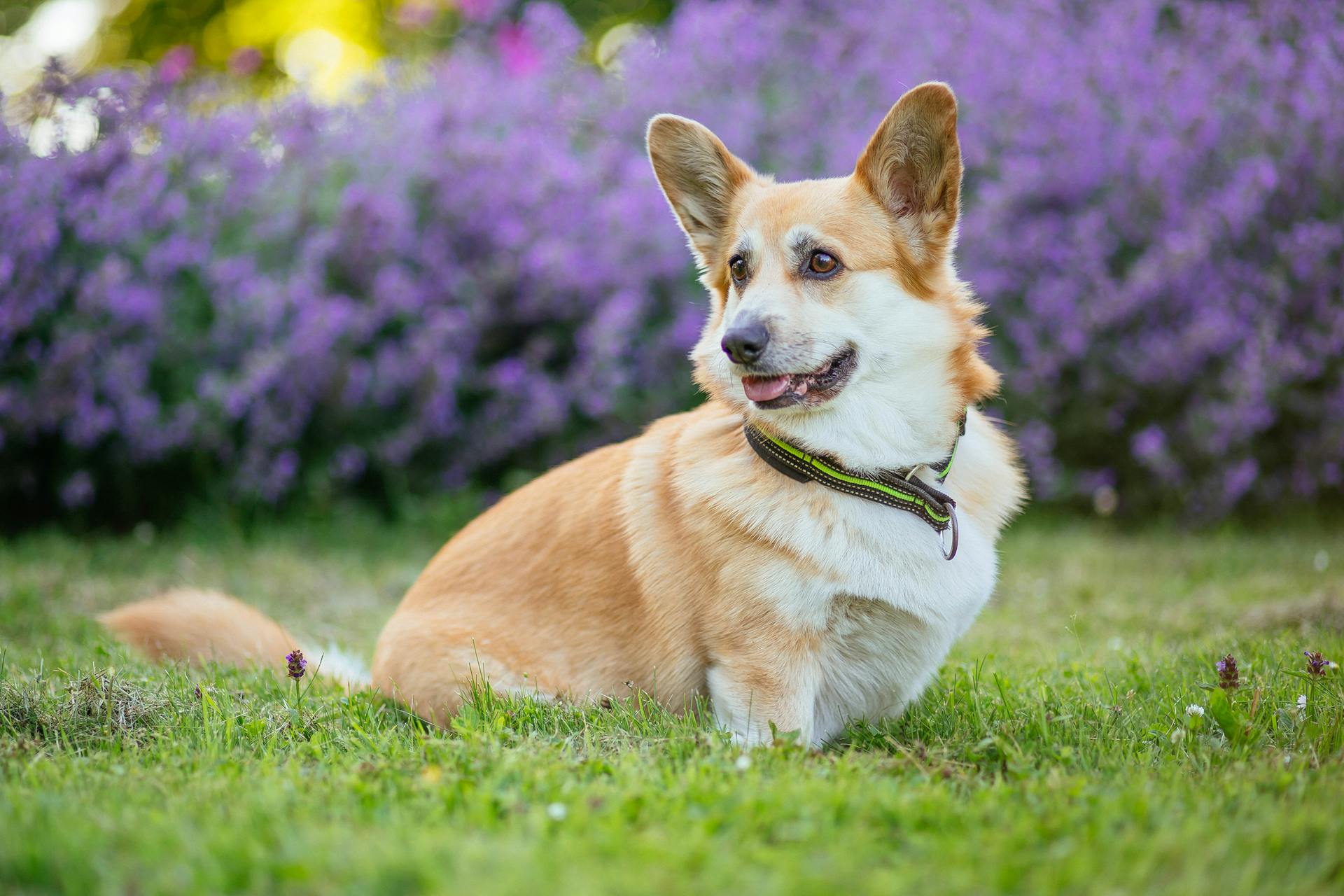
Corgis are a beloved breed, and for good reason. They're short, intelligent, and energetic dogs that make great companions.
Originally bred to herd cattle and horses, corgis have a strong work ethic and are naturally inclined to follow commands.
Their short stature and long bodies make them prone to back problems, so it's essential to provide them with regular exercise and a comfortable place to rest.
Corgis are known for their loyalty and affection towards their families, making them excellent family pets.
You might enjoy: Adopt Corgis
Breed Information
The Pembroke Welsh Corgi originated in Wales in the 1100s.
The breed's original purpose was to herd sheep and to lead them by biting their legs. They are still used as herders today.
Pembroke Welsh Corgis are the smallest of the American Kennel Club's Herding Group, and are also recognized by the United Kennel Club.
Their coats can be red, sable, fawn or tri-colored, usually with white markings on the legs, chest, neck, muzzle and belly.
Pembroke Welsh Corgis are intelligent dogs and are relatively easy to train. They can learn a variety of commands, and they are often used as therapy dogs.
They are known for being very friendly and playful dogs, and they love to be around people and other animals.
You might enjoy: Weiner Dog Legs
Breed History
The Pembroke Welsh Corgi is believed to have been introduced by Flemish weavers as a working dog, and its exact ancestry is often debated. Some historians think the breed may have descended from Vallhunds, Swedish cattle dogs brought to Wales by the Vikings in the 9th and 10th centuries.
The Pembroke Welsh Corgi was originally bred to herd sheep and lead them by biting their legs. Its primary function now is to serve as a loving companion, but it's still used as a watchdog, guard dog, and herder.
The breed gained popularity in the 1930s when King George VI gifted one to his daughters Elizabeth and Margaret. This marked the beginning of the Pembroke Welsh Corgi's association with royalty.
The Pembroke Welsh Corgi was officially recognized by the AKC in 1934 and has maintained a steady popularity ranking within the organization.
Worth a look: Corgi vs Welsh Corgi
General Information
The Pembroke Welsh Corgi is a small but mighty breed with a rich history. They were originally bred to herd cattle and sheep, and they still have strong herding instincts today.
Pembroke Welsh Corgis are known for their intelligence and are relatively easy to train. They can learn a variety of commands and are often used as therapy dogs.
This breed has a distinctive appearance, with a sturdy frame, short legs, and a foxy-looking head. Their coats come in a variety of colors, including red, sable, fawn, and tri-colored.
Pembroke Welsh Corgis are social animals and love to be around people and other animals. They make great companions for families and are known for their friendly and playful personalities.
To keep their coats looking their best, Pembroke Welsh Corgis need to be brushed weekly with a rubber curry brush to remove dead hair. They also require regular nail trimming, tooth brushing, and exercise to stay healthy and happy.
Pembroke Welsh Corgis are not hypoallergenic and are an average shedder, so regular brushing is essential to keep shedding under control. They are also prone to certain health problems, so it's essential to work with a reputable breeder and keep up with regular veterinary care.
Pembroke Welsh Corgis are active dogs that need daily exercise to prevent obesity and stay content. They thrive in living arrangements with access to plenty of running area and regular walks.
Overall, the Pembroke Welsh Corgi is a wonderful breed that makes a great companion for active families.
Take a look at this: Types of Corgis
Temperament and Personality
The Pembroke Welsh Corgi loves to be around people and is known to want to get involved with his family.
They are happy, loving, and intelligent dogs, but with a stubborn or independent streak at times. This breed is active and bold in terms of decisions, making them easy to train due to their intelligence.
However, they can be cautious around strangers and may nip at heels in response to play when they become excited. Early socialization is crucial to help them grow up to be well-rounded dogs.
Corgis are also natural watchdogs and can be suspicious of strangers, so they make great companions for families who want a loyal protector.
Temperament and Personality
The Pembroke Welsh Corgi is a social breed that loves to be around people and wants to get involved with his family.
They are active and bold, making them great companions, but they can be cautious around strangers and need to be trained at an early stage to know when to accept new people.
With proper training, they can be easy to train due to their intelligence and strong work ethic.
However, they can be stubborn or independent at times, so don't expect them to be subservient.
Food is a great motivator for them when training, but be cautious of overfeeding as they can become obese.
They make good watchdogs, being suspicious of strangers and quick to bark if they feel threatened.
Early socialization is essential to help your Pembroke puppy grow up to be a well-rounded dog.
With patience and training, they can learn to be gentle with children and other pets, but always supervise interactions between dogs and young children.
They have a remarkable affinity for children, but their herding instincts may cause them to nip at children's feet or ankles.
For more insights, see: Dog Handler Training
Your
Your temperament and personality are shaped by your genetic makeup, life experiences, and environmental factors. This unique combination influences how you interact with the world and the people in it.
Research suggests that your temperament is largely determined by your genetic predispositions, which can influence your emotional reactivity and regulation. For example, some people may be naturally more introverted or extroverted due to their genetic makeup.
Your personality, on the other hand, is shaped by your life experiences and environmental factors, such as your upbringing, education, and social interactions. This can lead to differences in how you approach challenges and relationships.
Understanding your temperament and personality can help you navigate relationships and make informed decisions about your life. By recognizing your strengths and weaknesses, you can develop strategies to improve your relationships and achieve your goals.
For instance, if you're naturally more introverted, you may need to make an extra effort to communicate your needs and boundaries in relationships. Conversely, if you're more extroverted, you may need to learn to listen more and ask for help when needed.
Health and Care
Corgis are prone to fractures due to their short legs and long backs, so be careful when lifting them up or letting them jump down from furniture.
A proper diet and exercise routine are crucial for a Corgi's health and happiness. Feed them a high-quality diet appropriate for their age, and don't give them people food.
To keep your Corgi's teeth and coat healthy, brush their teeth at least twice a week and their coat at least weekly, with daily brushing recommended during shedding season.
Here are some essential care tasks to perform regularly:
- Supervise your Corgi as you would a toddler, keeping doors closed and objects out of reach.
- Clean their ears weekly, even as a puppy.
- Trim their nails every 2-3 weeks to prevent tears and overgrowth.
Regular exercise and mental stimulation are also vital for a Corgi's well-being. Provide daily walks and engage their minds with activities to prevent boredom and naughty behavior.
Care
Taking care of a Pembroke Welsh Corgi is a big responsibility, but with the right routine, your furry friend will be happy and healthy. They need plenty of exercise every day, which can be as simple as a daily walk or playtime in the yard.
Pembroke Welsh Corgis are smart dogs that need mental and physical stimulation to prevent boredom, which can lead to naughty behavior. Keep their mind and body active with regular exercise and playtime. They're also well-suited for apartment life as long as they get daily walks.
Consider reading: Welsh Corgi Dog Breed

To keep your Corgi's coat looking its best, brush them at least weekly, with daily brushing recommended during shedding season. This will help remove loose hair and prevent matting. They also need regular nail trimming, every 2-3 weeks, to prevent tears and overgrowth.
A healthy diet is essential for your Corgi's overall well-being. Feed them a high-quality diet appropriate for their age, and avoid giving them people food. Measure their food and feed them twice a day to prevent overeating, and monitor their weight to ensure they're not overweight.
Here's a quick reference guide to help you keep your Corgi's care routine on track:
- Brush their coat at least weekly, with daily brushing during shedding season
- Trim their nails every 2-3 weeks
- Brush their teeth at least twice a week
- Clean their ears weekly
- Provide regular exercise and mental stimulation
- Feed a high-quality diet appropriate for their age
By following these simple care tips, you'll be well on your way to raising a happy, healthy Pembroke Welsh Corgi.
Size
Pembroke Welsh Corgis are between 10 and 12 inches tall at the shoulders, and weigh no more than 30 pounds. This compact size makes them a great fit for families with smaller living spaces.
Their small stature means they don't need as much exercise as larger breeds, but they still require regular physical activity to stay healthy.
Spay or Neuter
Spaying or neutering your Pembroke Welsh Corgi is one of the best decisions you can make for their health and well-being. It decreases the likelihood of certain types of cancers.
Spaying or neutering eliminates the possibility of your pet becoming pregnant or fathering unwanted puppies. This is especially important to prevent overpopulation and reduce the number of dogs in shelters.
Performing the surgery also gives us a chance to identify and address some of the diseases your dog is likely to develop. Your pet will be under anesthesia at this time, making it a convenient opportunity.
Routine blood testing prior to surgery helps us identify and take precautions against common problems that increase anesthetic or surgical risk. This ensures your pet's safety during the procedure.
Genetic Predispositions
Pembroke Welsh Corgis are prone to certain genetic conditions that can affect their quality of life. Some of these conditions can be inherited, while others may develop over time.

Hip and elbow dysplasia are inherited diseases that cause the joints to develop improperly, leading to arthritis. This can result in stiffness, lameness, and difficulty getting up from lying down.
Your Pembroke's weight can also play a role in the development of arthritis. Overweight dogs may develop arthritis years earlier than those of normal weight, causing undue pain and suffering.
Some eye conditions, such as cataracts, can cause blindness in older Pembrokes. Cataracts occur when the lenses of the eyes become more opaque, or cloudy, over time.
Progressive retinal atrophy (PRA) is an inherited disease that can cause blindness, but it's not painful. Early symptoms of PRA, such as night blindness or dilated pupils, can begin around three to five years of age.
Distichiasis is a condition caused by extra hairs that grow inside the eyelid and rub on the surface of the eye. This can cause corneal ulcers and chronic eye pain if left untreated.
Here are some common eye conditions that can affect Pembroke Welsh Corgis:
- Cataracts: cause blindness in older Pembrokes
- Progressive Retinal Atrophy (PRA): inherited disease that causes blindness, but is not painful
- Distichiasis: causes corneal ulcers and chronic eye pain if left untreated
- Persistent Pupillary Membrane: small strands of tissue that can cause secondary problems, but usually don't hurt or impede vision
Training and Lifestyle
To keep your Corgi happy and healthy, you'll want to establish a routine that includes regular exercise and mental stimulation. This breed is highly intelligent and needs to stay active to prevent boredom and naughty behavior.
Corgis are surprisingly fast and agile, so they require daily exercise to keep them physically and mentally stimulated. They're also well-suited for apartment life as long as they get regular walks.
Here are some essential exercise tips for your Corgi:
- Provide daily walks for your Corgi
- Exercise your dog regularly, but don't overdo it at first
- Make sure your Corgi gets plenty of physical stimulation to prevent obesity and keep them busy and content
It's also crucial to ensure your Corgi gets enough rest and relaxation time. Be mindful of their short legs and long backs, and avoid lifting them up or letting them jump down from furniture, as this can lead to fractures.
Trainability
Trainability is a crucial aspect of training and lifestyle. It refers to how well a person can learn and adapt to new information, skills, and habits.
The ability to learn new things is closely tied to a person's motivation and engagement. Studies have shown that people who are more motivated and engaged in the learning process tend to perform better and retain information longer.
A key factor in trainability is the concept of "neuroplasticity", which refers to the brain's ability to reorganize and adapt in response to new experiences. This means that people can actually change their brain structure and function through practice and repetition.
Regular exercise has been shown to improve cognitive function and increase trainability. In one study, participants who exercised regularly showed significant improvements in memory and learning compared to those who did not exercise.
Mindfulness and meditation can also improve trainability by reducing stress and increasing focus. By training the mind to stay present and focused, people can improve their ability to learn and adapt.
The right sleep habits are essential for trainability. During sleep, the brain consolidates and processes new information, making it easier to learn and remember.
A healthy diet rich in fruits, vegetables, and whole grains can also support trainability. A study found that a diet high in fruits and vegetables was associated with improved cognitive function and memory.
Getting enough social interaction and support can also boost trainability. People who are part of a supportive community tend to be more motivated and engaged in the learning process.
Care and Lifestyle
Taking care of a Pembroke Welsh Corgi requires attention to their diet, exercise, and grooming needs.
To keep your Corgi out of trouble, supervise them like a toddler and keep doors closed. This will prevent them from getting into objects they shouldn't put in their mouth.
A weekly brushing is essential to prevent matting and tangling of their coat. Twice a year, they blow their coat and lose a lot of hair, so daily brushing is necessary during this time.
Pembroke Welsh Corgis generally have good teeth, but regular brushing is still necessary to keep them perfect.
Their ears should be cleaned weekly, even as puppies.
With their short legs and long backs, Corgis are prone to fractures if they jump down from furniture or are picked up incorrectly.
A high-quality diet is crucial for your Corgi's health, and feeding them people food should be avoided.
Here's a quick rundown of your Corgi's daily needs:
- Supervise your Corgi like a toddler
- Brush their coat weekly (daily during shedding season)
- Clean their ears weekly
- Brush their teeth at least twice a week
- Provide daily walks and exercise
- Feed a high-quality diet
Remember, a consistent routine and regular care will keep your Corgi happy and healthy.
Similarly Sized Breeds

If you're considering bringing a Pembroke Welsh Corgi into your family, you might be wondering about other breeds that share similar size and characteristics.
The Petit Basset Griffon Vendeen is a similarly sized breed, with a 98% similarity rating.
When training a Corgi, it's essential to keep in mind their strong prey drive and independent nature.
The Doxie-Pit, on the other hand, is a crossbreed that shares some of the Corgi's energetic and playful traits, with a 95% similarity rating.
A well-exercised Corgi is a happy Corgi, so be prepared to provide plenty of physical and mental stimulation.
The Corgi Pug and Bullhuahua Terrier are also similarly sized breeds, with 93% similarity ratings.
Training a Corgi requires patience, consistency, and positive reinforcement.
Here are some similarly sized breeds to consider:
- Petit Basset Griffon Vendeen (98% similar)
- Doxie-Pit (95% similar)
- Corgi Pug (93% similar)
- Bullhuahua Terrier (93% similar)
- Goldenshire (92% similar)
Frequently Asked Questions
Do Corgis bark a lot?
Yes, Corgis are known to bark excessively, but the frequency of barking can vary between individuals and depends on several factors
Are Corgis expensive dogs?
Yes, Pembroke Welsh Corgis can be a significant investment, with prices ranging from $1,000 to $2,200 from a reputable breeder. However, their loyal and loving nature may make them a worthwhile addition to the right family.
Are Welsh corgis high maintenance?
No, Welsh Corgis are considered low maintenance. They are a great choice for busy owners who want a loving companion with minimal fuss.
Are Welsh corgis good house dogs?
Yes, Welsh Corgis are adaptable and make great family pets, suitable for both city and country living. They're a great choice for families with kids who plan to expand their household.
What are Welsh corgis known for?
Welsh Corgis are renowned for their exceptional herding abilities and have been used for centuries to herd livestock on farms. They are also skilled family companions and guardians, making them a beloved breed.
Sources
Featured Images: pexels.com


